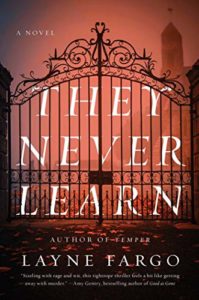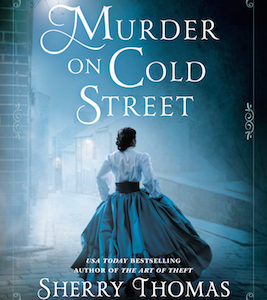I’m a professional crime writer who’s sold multiple psychological thrillers to a major publisher. But I have a confession to make: I hate writing about crime.
Not the crimes themselves—violence and murder and manipulation, that’s the fun part! Unfortunately, though, when you write these things into your story, police characters tend to show up, and then you have to know all about forensics and laws and other boring procedural stuff. That’s the part I hate.
Luckily, I have a secret weapon: my author friend and Unlikeable Female Characters podcast co-host Wendy Heard, who’s a true crime aficionado and walking treasure trove of random murder facts. Recently I sat down with Wendy to talk about how to get away with (fictional) murder.
Wendy Heard: So we are here to talk about crime writers who hate writing crime.
Layne Fargo: That’s me! In my first book, Temper, there’s not really a central crime. It’s a lot of horrible people psychologically manipulating each other and having hate sex—all my favorite things. But when it came time to write my next book, I made a huge mistake.
WH: You did. You wrote a character who’s super calculating. She’s very smart. She’s not going to accidentally do anything. So you have to think like her.
LF: I wrote this character, Dr. Scarlett Clark, who’s a female serial killer, and she’s been getting away with it for over a decade. She’s very good at murdering people in a way that looks like an accident or like suicide, and that would fool the police. Which meant I had to figure out how to fool the police.
WH: You’re going to hear it from all of your crime fiction readers, if you don’t get that at least somewhat right. They’re going to be so mad at you.
LF: I kept using my favorite defense, which was: this is a small town, the cops are stupid. And you said, no, that was not enough.
WH: Especially because in a small town, if they start having a rash of murders, unfortunately they will call in the FBI’s nearest field office, or they’ll start borrowing labs from their neighboring larger cities.
LF: Dammit.
WH: Yeah.
LF: What else did I do wrong in those early drafts of the book, where you had to slap my wrist and tell me I was doing crime wrong?
WH:There was a thing with her bringing her phone to the scene of a crime.
LF: That was very stupid. Don’t do that.
WH: I mean, look, people do that. People get caught that way, but the hard thing with this character was she would know better. The hardest part about planning fictional murders is making it interesting and realistic at the same time. Cause if it’s like real life, it’s too boring, but at the same time you have to make it realistic.
LF: You said something to me about working within the typical police procedure—that there are certain things they do at certain times. You can fight it if you want, but you are much better served by knowing it and using it as part of the structure of your book.
WH: The police are a machine that’s going to move at a certain pace. And that machine can be a very good ticking clock, but it’s also very good at messing up the plot that you’re trying to write. Cause it’s like day seven of the investigation, and you want everybody over here, but instead they’re over here doing this other thing.
LF: Or if they’re my characters, they’re just having sex with each other somewhere.
WENDY: You kept being like, I don’t think the police would investigate this very much, because it seems like an accident. No, they’re going to investigate it.
LF: I don’t want to give any spoilers for my book, but there’s one scene you helped me with a lot, where I was just like, oh, it was self-defense, or—
WH: Right, right.
LF: Some hand-wavy explanation. And you said that wasn’t realistic, but what might be realistic is if there’s so much differing evidence that it’s not conclusive. So even if the police could reasonably assume what happened, it was not something that would stand up in court.
WH: I like that technique. A lot of times we’re like, how do we hide what happened? And it’s more interesting to not hide what happened, but to confuse it to the point where they don’t have enough evidence, or there are enough multiple narratives that any one of them could be thrown out in court. I’ve always thought, what if you just start adding stuff to the crime scene?
LF: I used that too! There’s a scene in They Never Learn where she murders someone, and she specifically chose to do it right after this person had a large party at their house, which she attended. So there might be hair and fingerprints, but who’s to say if it’s from the party or if it’s the person who killed him.
WH: It’s important to remember that criminals in real life are very stupid, but your criminals in books are not allowed to be stupid. People won’t tolerate it.
LF: We appreciate competence, even if it’s morally wrong.
***


















